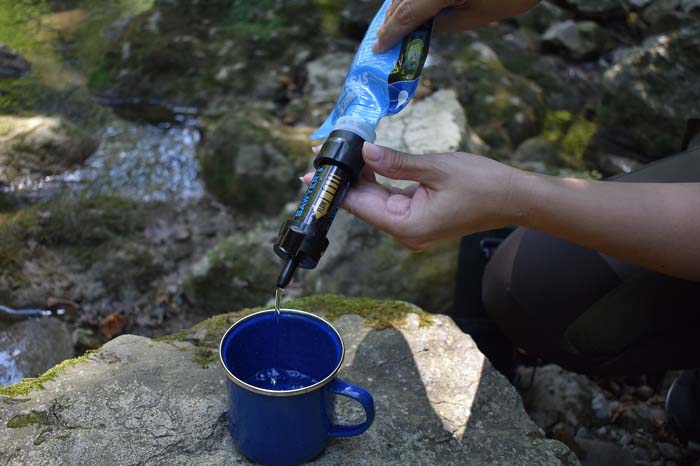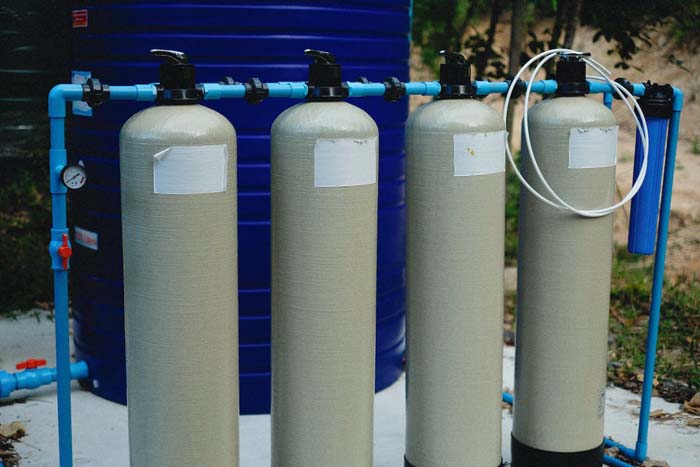
Water filters improve the quality of water by removing impurities such as germs, odor, sediment, and taste. From improving the taste of drinking water to making clear ice to brewing coffee, there is a water filter for every water-related problem.
Water filtration could eliminate chlorine odor and taste and stop limescale buildup, two of the many typical problems with water.
Here are 5 types of water filters
1. Reverse Osmosis Filters (RO)
Through pressure and a semipermeable membrane, reverse osmosis (RO) can remove inorganic particles from water, including calcium ions and magnesium. This makes it such that only water, free of pollutants, may flow through.
Since they are so effective at filtering out harmful contaminants, reverse osmosis filters have skyrocketed in popularity. Another benefit is that water softeners may remove salt from drinking water, which is a great feature in a home.
This method gets rid of many harmful substances in water. These include salt, radium, nitrites and nitrates, arsenic, hexavalent chromium, fluoride, and copper.
Combinations of reverse osmosis and other filters, such as absorption (activated carbon) and mechanical sediment filters, are common.
Pros:
- Can purge water of up to 99% of impurities
- Effectively eliminates viruses, bacteria, and contaminants.
Cons:
- Lots of wastewater
- Costly.
2. Ion Exchange Filters
By exchanging ions such as hydrogen or sodium for ions such as calcium or magnesium, ion exchange can soften hard water. These water filters may effectively remove radioactive materials and hard water.
The ion exchange process physically removes hard minerals to prepare water for uses requiring a steady high temperature, which reduces limescale.
The use of ion exchange resin, often in the shape of tiny beads, is the most common way of ion exchange. There are water softeners that use a similar type of resin. This resin, in turn, uses sodium ions, which need frequent refilling to ensure the resin doesn’t run out.
Because hard water can cause pipes to harden, shortening the lifespan of some kitchen appliances, this sort of filter can be useful for your pipes. The one drawback of this filter type is that it isn’t the most effective at removing bacteria, particles, or organic matter. As a result, you may use it in conjunction with other filters.
Pros:
- Simple to use and reasonably priced
- Very efficient in getting rid of heavy metals like magnesium and calcium.
Cons:
It is possibly not as effective as other types of water filters when it comes to removing various contaminants.
3. Activated Carbon Filters
These effectively remove sediment, magnesium, chloroform, chlorine, organic substances, and agricultural chemicals.
The process of adsorption is fundamental to understanding the operation of activated carbon. Adsorption refers to the process by which one material clings to another as it passes through, in contrast to “absorption,” which occurs when one material takes up another.
Organic materials with a high carbon content, such as coconut shells, coal, or wood, can be transformed into activated charcoal. This is done by subjecting them to heat that causes charring rather than burning. Toxins and contaminants are bound to the porous substance created by treating the char. That, along with any pollutants, is drained from the water.
Pros:
- Excellent at neutralizing unpleasant water flavors and odors
- Simple installation
- Less expensive
Cons:
- Compared to other water filters, it might also be unable to get rid of viruses and bacteria.
4. Mechanical Filters
Mechanical filtration uses a barrier to physically filter out debris, sediment, and other particles from your water. One kind of water filter is a mesh, which traps larger particles. Another is a ceramic filter, which traps even more dangerous organisms thanks to its intricate pore structure.
Mechanical water filters often carry out the pre-filtration process. Waste materials will become entangled in pads, synthetic foam, or nylon floss when water passes through the filter. Mechanical filters have the advantage of capturing all of the unwanted pollutants while avoiding any beneficial ones.
The micron rating is a common way to measure the effectiveness of mechanical filters in eliminating particles of a particular size.
5. UV Water Filters
These have a shorter wavelength than visible light and is electromagnetic radiation. Microbes like viruses and bacteria have their cell walls penetrated when water is exposed to ultraviolet light. It renders them harmless by damaging their DNA, which prevents them from reproducing.
Ultraviolet water filters kill 99.9% of viruses, bacteria, and other potentially harmful microbes. They are a popular chemical-free and low-maintenance water filtration option in industries, commercial settings, and homes. On the other hand, ultraviolet water filters do not remove chemicals, chlorine, or sediment. In order to get the water clean enough to go through the ultraviolet light, a pre-filter will help.
Pros:
- Low initial investment and low ongoing maintenance costs
- Works wonders in water disinfection
Cons:
- Can’t function without power
- Leaves behind traces of minerals and chemicals
Which water filter removes the most contaminants?
Reverse osmosis (RO) gets rid of pollutants better than any other filter. Distillation, a type of water purification that does not use water filters, gets rid of even more. Choosing the best water filter for your home is much more challenging, even though knowing which pollutants various filters remove may seem straightforward.
Distillation removes the most pollutants from all the methods used to filter or purify water. Distillation kills viruses and bacteria while removing mineral ions, organic compounds, heavy metals, and microplastics. While it doesn’t eliminate viruses and microbes, reverse osmosis removes many of the same pollutants.
The healthiest way to filter tap water?
By removing as much as 99.5% of dissolved solids and other dangerous pollutants, reverse osmosis filters are incredibly efficient at cleaning water of impurities. Reverse osmosis filters can successfully remove viruses and bacteria from water supplies. When it comes to purification, reverse osmosis is above the competition. Because it is able to target more impurities and remove them more efficiently, it is superior to sediment filters and basic carbon filters.
Best place to put a whole house water filter?
This method ensures you and your family can always access clean water for household needs. For example, washing dishes, taking showers, and cooking. In contrast to water filters installed under sinks, which primarily target water for cooking and drinking, this one will purify all water entering your home.
The answer depends on the brand and model of your whole house water filter. For instance, a cartridge-based system must be set up before the water heater. The heater can potentially reduce the cartridge’s effectiveness by causing silt and other impurities to accumulate. It is possible to add a reverse osmosis system after the water heater.
The placement of your main water pipe is another consideration. The filter’s effectiveness increases as its proximity to the entrance increases. This is because the water will undergo filtration to remove pollutants and sediment before reaching your home. On the other hand, put the filter closer to the area that will use it the most if the main water line is in an inconveniently placed spot.
How long do home water filtration systems last before I can replace them?
Installing a full water filter is one of the best ways to guarantee water flows out of every tap in your house. Replacement of filters prior to excessive wear and tear or clogging is an important part of any water filtration system maintenance plan. This is to ensure the system continues to function correctly.
 Many things affect how long a whole house water filter lasts. Here are several examples:
Many things affect how long a whole house water filter lasts. Here are several examples:
- The concentration of sediment and minerals in your water supply
- The filter’s capacity and size
- How much water do you typically use each day?
Depending on your needs, you can get water filters in a range of sizes, making them more economical or extending their lifespan. A water filter’s capacity is defined by how much water it can filter before requiring replacement. For example, a filter’s capacity to process 100,000 gallons of water over its lifetime could be mentioned.
The following are the typical lifespans of whole house water filters:
- Post-Filter: Up to 12 Months
- Carbon Filter: 1 Year
- Pre-Filter: 3–6 Months
What happens if the filter isn’t changed?
A filter can capture your water’s chemicals, minerals, and sediments. A buildup of debris causes these filters to become inoperable eventually. Filters get more clogged the longer you let them go without replacement.
Your tap water may revert to its original condition if your filter stops collecting sediments after a certain amount of time. Water safety, taste, and purity might be compromised if mold and other bacteria grow inside the filters.
Conclusion
There are a variety of water filters on the market, and each one has its own set of pros and cons. Consider what you need the water for and what kinds of impurities are in your water before buying a water filter. It is important to investigate the abilities of each filter before buying one, as some may be better at removing particular impurities than others. Clean, safe drinking water can last years with the correct water filtration system.
How worried are you about the safety of the water you drink? When you need water filtration, look no further than Express Drainage Solutions! We have installed cutting-edge water filters to ensure our customers can access safe drinking water. Contact us today to find out how our goods can help you and your loved ones. Choose our dependable and efficient water filtering systems if you refuse to settle for subpar water for human consumption.

